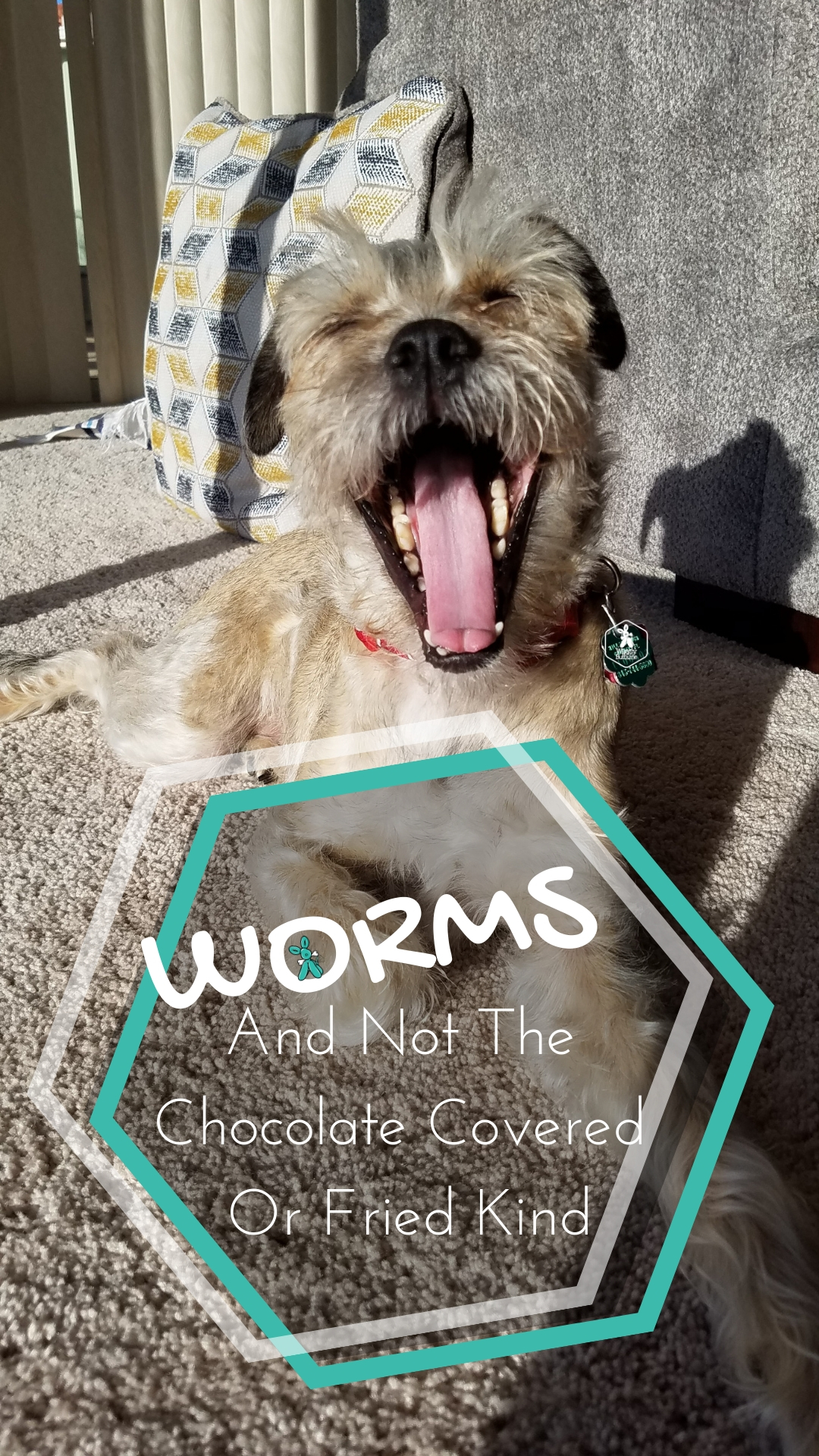I doubt you want rice in your bed. #ThatsNotRice

Keep reading if you:
- Want to learn more about internal parasites
- Are not sure if your dog has worms
- Need to know How to help prevent worms in your dog
IF THIS IS A VETERINARY EMERGENCY PLEASE CALL YOUR VETERINARIAN OR POISON CONTROL IMMEDIATELY!
THE INFORMATION PROVIDED HERE IS FOR EDUCATIONAL PURPOSES ONLY AND NOT A SUBSTITUTE FOR PROFESSIONAL ADVICE OR TREATMENT.
WORMS!
and not the chocolate covered or fried kind
Who spilled rice everywhere? What is that wiggling in Baxter’s poop?
Ummmm yeah… that is not a good question to ask when you have a dog.
You may just find out it is not rice. On the contrary [this is gross, so get ready]… THEY ARE TAPE WORM SEGMENTS CONTAINING EGGS THAT CAME OUT OF YOUR DOG’S BUTT!
That WigglyButt isn’t looking so cute now is it?!
This can happen to any dog. Quite frankly, it can happen to humans too.
Yes, it can be ikky. Yes, it can be scary. Yes, there is a treatment.
When adopting a dog – rescue, store, or breeder- always get your dog tested for worms. For your sake and their health, do not skip out on a hunch. It is always better to be proactive rather than reactive.
There are different variations of worms that can take residence in your furry buddy’s gut.

//1//
WHO and WHAT am I talking about?
Okay. Time out!
I am talking about your furry buddy and the possibility that worms may be calling your doggo’s gut home.
What kind of worms are we talking about here? [Hint: not the fishing kind]. These are internal parasites that drain creatures of life sustaining nutrients, and that is before they become The Walking Dead.
Does that sound gross? Well, this is just the beginning.
Commonly there are 4 types that can be seen in poop without a microscope that dogs fall prey to:
- Tapeworms
- Hookworms
- Roundworms
- Whipworms
Yes, there are more types. Yes, there are variations of the ones about that live in organs outside of the intestines. I did say it gets grosser.
How about this one…
TapewormsHookwormsRoundwormsWhipworms- Heartworms
Not so fun fact: Most puppies are born with some variation of worms.
All dogs who have seen poop, mosquitoes, and fleas [amongst other things] are at risk for worms and should be checked routinely. [Yes, I realize that equals all dogs. Pi and I are happy you picked up on that.]
//2//
WHERE do they come from?
How do worms end up living in a dog’s intestines? Where do internal parasites come from?
Remember that one part where I said “All dogs who have seen poop, mosquitoes, and fleas [amongst other things] are at risk for worms and should be checked routinely?” Well that is a glimpse into how your beloved started to unknowingly harbor fugitives.
Dogs eat almost everything and anything.
If their cold wet nose found it, then it has a chance to be eaten. If their eyes get a glimpse of it, then it may be eaten. Also if the neighbor has fleas, then that’s another can of worms.
A dog can get worms by eating feces of any animal that has worms, eating an animal that has worms, and not limited to eating fleas that carry worm eggs. Puppies can also get worms from their mother’s breast milk.
Wait there is more! Dogs can get heartworms by being bitten by mosquitoes. This is a sucky one especially for those of your who have trained your pupper that eating poop ruins everyone’s smile.
Through the computer screen, I can sense the horror you’re currently experiencing.
A third of you have just decided to put all of those WigglyButts in diapers and simultaneously vowed to not go to the dog park ever again [unless of course it is in door, the other WigglyButts are in diapers, and it is a flea free zone].
Another third are stuck on the fact that most puppies are born with worms and if that is true then how are there so many wild dogs in the world?
The last third just want to know where this is headed and what they need to do.
So moving on…
//3//
WHEN will your pup let you know if there is a shituation?
What signs will be present that my dog has worms? When will the internal parasites rear its ugly head?
I cannot stress the importance of routinely checking your dog for worms. This means an annual vet visit. This also means noticing the different shades of poop that comes out of that WigglyButt. Not to mention the importance of paying attention to your companion’s energy level and weight.
How often do you really look at your dog’s poop. You’re half way there since you ARE picking up after your doggo.
//4//
WHAT to do now?
You just learned about the infestation so now what… Who you gonna call? Ghostbusters! [Insert theme music here… in your head].
What do I do about these worms?! How in the world do I keep my dog safe from parasites?
The best place to start is at your doggo’s vet. You want the beset for Baxter, and the vet can give you insight to how serious the shituation is, and prescribe deworming meds.
In the wild, wolves choose only off of the daily fresh catch menu. The fresh raw meat diet is filled with enzymes that promote immunity. These enzymes eradicate or at the very least keep the worms at bay. A wolf’s natural diet aids in keeping them safe from diseases due to parasites.
This does not mean you need to start Baxter on a raw diet from their next meal on. That switch can be detrimental to their gut.
Talk to your vet about a deworming medication. Common active ingredients in dewormers may include:
Pyrantel Pamoate
Piperazine
Fenbendazole
Praziquantel
Ivermectin [lice medicine?!]
Each medication works differently. Some require multiple rounds of treatment. The type of medication may be the same for human treatment, but the dosage may vary. Remember this the mechanism in which these anthelmintics [word of the day…means dewormer] work are also different.
Worm equality does not exist in the world. Make sure and seek medical advice from your vet to better understand the type of worm and appropriate treatment.
I am no vet, but I am a proud WigglyButt companion and I peruse health journals here and there. With that in mind… there are also some home remedies to consider that may help your WigglyButt’s shituation.
When considering home remedies, it is usually a good idea to have a conversation with your vet incase the remedies will cause additional harm to your dog.
Some popular at home treatments and preventative measures may include and are not limited to:
Coconut oil
Pineapple
Papaya and papaya seeds
Peppermint
Kefir
Keep in mind that some internal parasites thrive on sugars, so supplements may be better suited. This is why seeking professional medical advice is important. The tips and tricks mentioned here are not a substitute for licensed veterinary consultation and treatment.
//4//
HOW can you prevent worms from claiming your buddy’s body as their home?
Evaluate what you are currently doing for your doggo’s health. I mean, you are taking time to educate yourself for the sake of Baxter’s health. That’s a huge step in the right direction. So congrats in taking the initiative in your buddy’s health!
Take the next step.
Look at your dog’s poop. This is the easiest and cheapest thing you can do! Even if you look at your doggo’s poop, do not skip the annual vet check-ups. Have Baxter tested for worms and assess the situation.
Domestic dog and wild dogs are different. We have taken responsibility for every aspect of a dog’s life when we bring them into our lives.
To keep your dog worm free, teach them to not want to eat poop. furthermore, depending on your lifestyle, administer flea, tick and heartworm supplements.
I say “based on your lifestyle” because if you live in the arctic, then there are no mosquitoes. If there are no mosquitoes, then you may be clear of the threat of heartworms. Speak to your vet.
A well balanced, healthy diet aids greatly in supporting the good bacteria in your doggo’s gut. In any animal, a healthy gut leads to a happier life!

summary
Do you have rice bits in your bed?
Internal parasites can be deadly. you love your furry buddy so don’t let them down. Take charge and help them out by looking at some poop. Yep. that is a great place to start.
As mentioned before, having the vet check out your doggo in order to determined if a de-worming regimen is necessary is also a must.
I doubt you want rice in your bed. #ThatsNotRice
Has your doggo had worms? What have you done to resolve the issue?
IF THIS IS A VETERINARY EMERGENCY PLEASE CALL YOUR VETERINARIAN OR POISON CONTROL IMMEDIATELY!
THE INFORMATION PROVIDED HERE IS FOR EDUCATIONAL PURPOSES ONLY AND NOT A SUBSTITUTE FOR PROFESSIONAL ADVICE OR TREATMENT.



